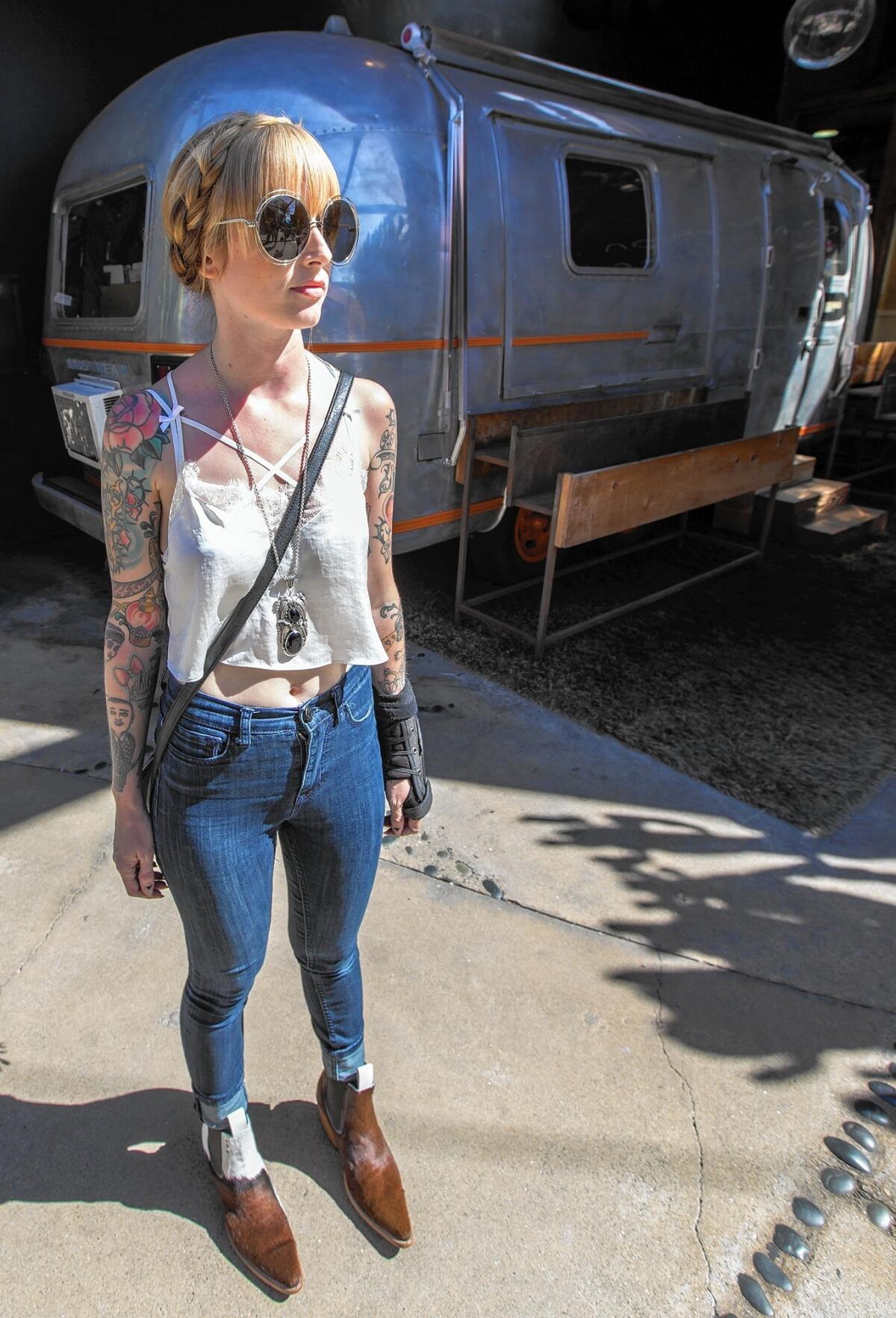Hansen: The death of hipsters is greatly exaggerated

- Share via
Wary are the young hipsters.
Just wanting to be left alone, they ask for nothing, except maybe the price of that vintage T-shirt.
They are anxious because they are defined, which was the last thing they wanted. But for some reason, society decided hipsters needed to be labeled, pigeonholed and tucked away in a convenient see-through box.
On sale at an Urban Outfitters near you.
“I don’t like that it’s become a label,” said Amanda Flaum of Costa Mesa. “I think we’re just all artists.”
Flaum had just left the Buffalo Exchange at The Lab Antimall, looking for a good deal on used clothing. A hairstylist, tatted and decked, she feels that at her age, she’s comfortable with who she is and doesn’t need to have someone question her sincerity.
“I’m 35, and I’ve looked like this for a long time, since I was 18,” she said. “I get questioned about my tattoos, like why would I want to do that to myself. I fell into it with the music culture. Nowadays, it’s all about fashion.”
Perhaps the hipster backlash has to do with the visual cues, which seemingly vary season by season.
After all, there is the men’s facial hair, fastidious despite its burliness.
Or the carefully constructed nerdiness, which has a flair of metrosexuality.
And let’s not forget the epic man buns, pouchy, bound and rubberized — by their nature, constipated. The online man bun jokes, videos and sarcasm border on abuse.
Most other subculture groups throughout recent history had some kind of backbone or cause: literary enlightenment, anti-war, anti-establishment, equal rights.
Is it unfair to say that hipsters don’t?
“I think there is some cultural prejudice,” said Dan Benporat, who works at the As Issued bookstore and art space in The Lab.
From his vantage point behind the counter, he sees the eclectic parade and reads a lot of contemporary theories about his generation. A recent graduate with a degree in economics from UC Irvine, he is quick to point out the financial ironies of hipsterism.
“It’s been co-opted by corporate interests,” he said. “It’s somewhat played out. The new thing is ‘basic.’”
Just as the name implies, the basic look is stripped, barren of ego, as if people are tired of being called names so they are trying harder to look like nothing.
“It’s like they have no opinions or style,” Benporat said. “I think a lot of people over-intellectualize, like armchair sociologists.”
Benporat paused to ring up someone buying a postcard — blank inside, of course.
You can tell he has thought a lot about these issues. People in the store usually just thumb through the edgy books and magazines, giving him time to read.
He glanced up from the cash register, continuing his thought.
“It’s the hipster milieu,” he said, drawing from his studies of French sociologist Pierre Bourdieu.
Using the new “creative economy” as the context, Benporat said hipsters are establishing themselves as the cultural authorities of their time, which means they can succeed where others don’t.
There is a backlash, however, that is clearly seen in today’s anti-hipster vitriol. Even though no one self identifies as a hipster, the term can breed anxiety, antagonism, jealously and maybe even hatred.
Benporat looked out into the antimall’s crowd of young people, as if for reinforcement.
“If you think about it, ‘basic’ is so reductive — probably the most reductive thing there is,” he said.
Despite the latest labels like basic or “normcore,” there is still a deep canon of fanciful descriptions for the hipster universe. Some may say the hipster died in 2009, but that certainly was not the case.
Just spend an hour sitting in the Orange County epicenter of hipsters, The Lab, and there is no doubt the culture is still alive:
• Overhead music: Wilting, pre-war jazz standards — remixed, of course, with an alt-Lilith crooner — blend into a downtempo Jamie xx song.
• Barber shop 2.0: The bearded barbers at the Crew Salon stand out on breaks with e-cigarettes and scruffy boots. There is a Lenny Kravitz authenticity about them.
• Tourists: You can tell they are there only because of the Yelp reviews. They look around for something to happen — or someone to see — taking unabashed selfies, hoping they look the part.
The key differentiation seems to be in the effort. If you look like you’re trying too hard, you probably are, making you appear uncomfortable and skittish.
Contrast that with Flaum, the waifish yet confident hairstylist. Using her brown and white pony fur Chelsea boots, she doesn’t apologize when she walks through the Lab; she gracefully gallops. There is no hesitation, no fretting or paralyzing soul searching.
“It’s strange,” she said. “I bet there are people who feel I’m a poser. But I don’t care.”
DAVID HANSEN is a writer and Laguna Beach resident. He can be reached at [email protected].